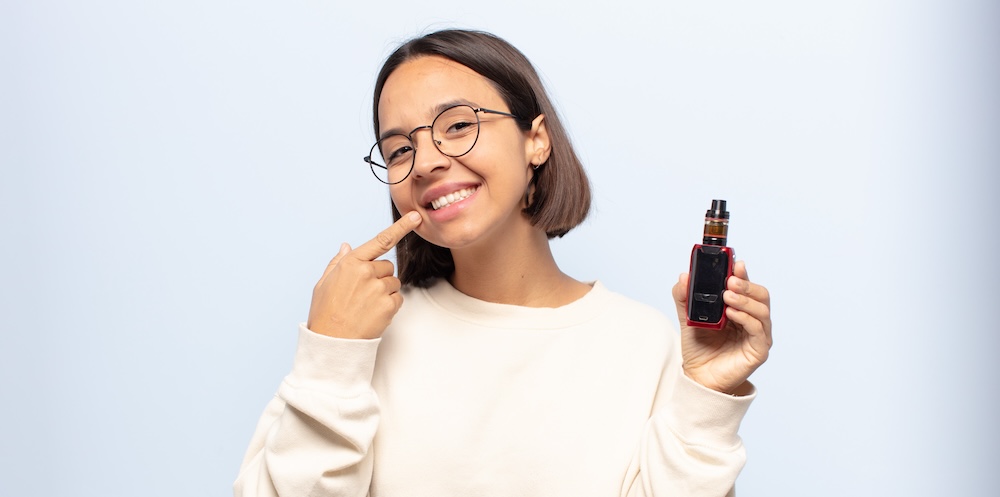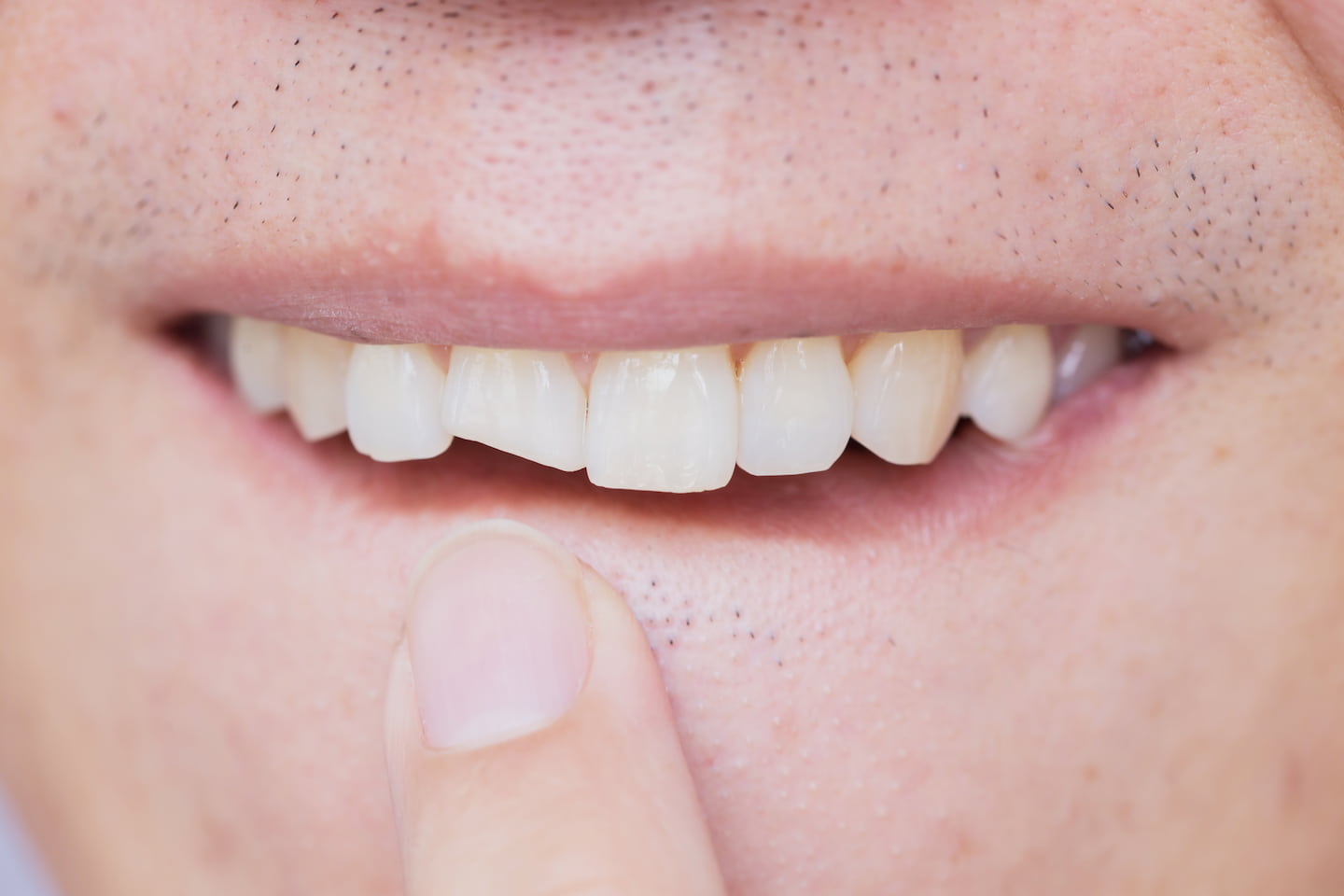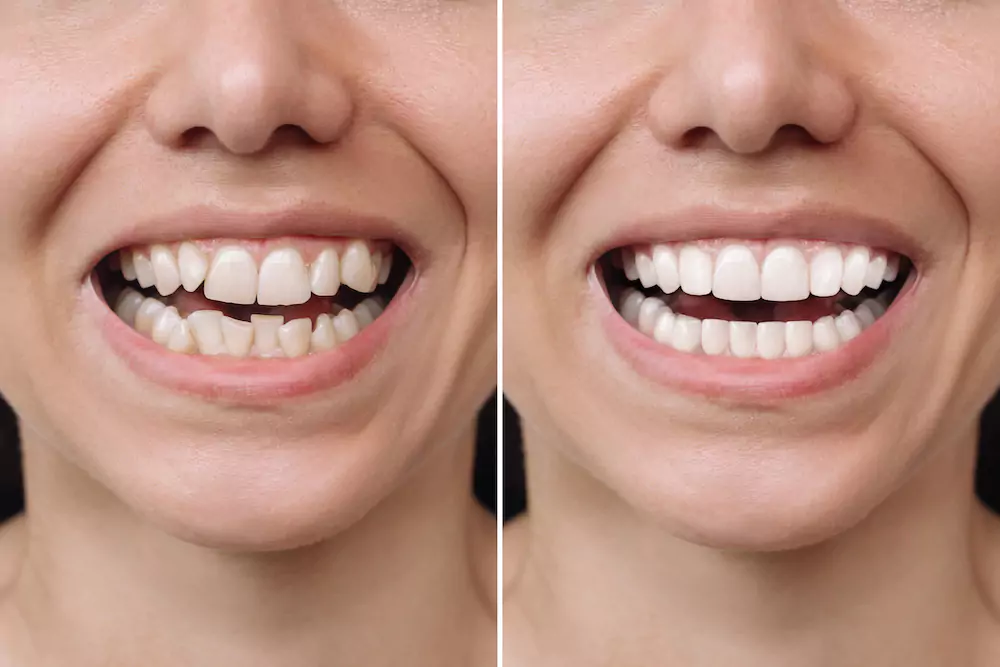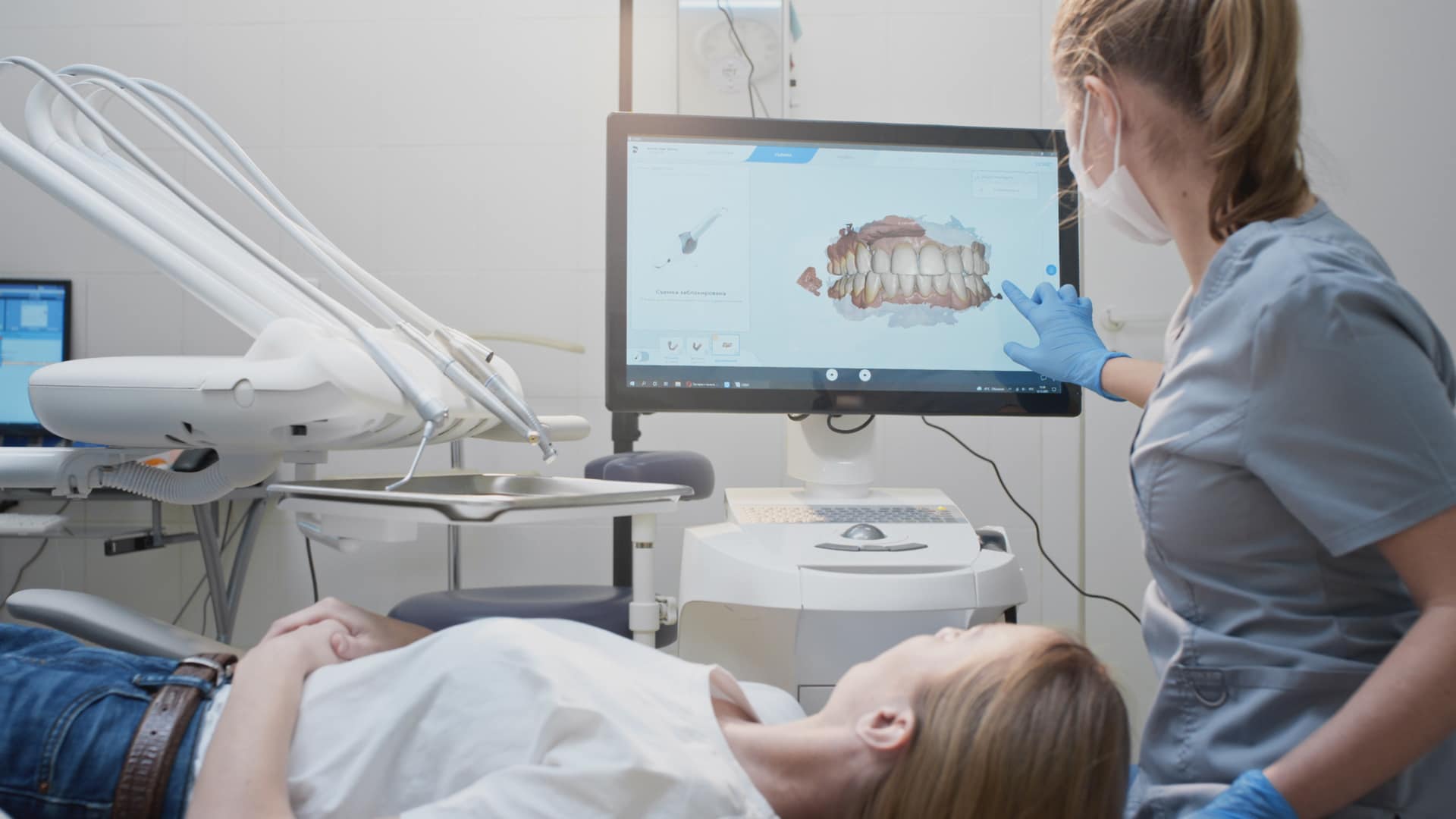
Is Vaping Bad for Your Teeth?
I’ve been a dentist for over a decade, but in the last several years I’ve noticed a huge increase in the number of patients who vape.
As such, there is a question I have been getting a lot recently: is vaping bad for your teeth? The answer is always yes, vaping is bad for your teeth. While it is marketed as a healthier alternative to smoking, vaping damages oral health in many ways.
In this post, I’ll cover 8 ways vaping damages oral health, how to minimise the negative effects of vaping, and answer some of the questions I hear most often from my patients.
Quick Summary
- Vaping puts you at risk of long-term damage to your gums, teeth, mouth, and throat
- The nicotine, propylene glycol, and other ingredients in e-cigarettes can stick to teeth and cause bacterial overgrowth, demineralisation, dry mouth, enamel erosion, decay, and staining
- Smoking and vaping are both harmful to oral health but vaping may be slightly less damaging since it does not contain tar
- Patients should wait a minimum of 72 hours after teeth whitening to vape to achieve the best results
- Patients should wait a minimum of 72 hours after wisdom tooth removal to vape
- To minimise the negative effects of vaping, I recommend sticking to a strict oral hygiene routine, staying hydrated, minimising how often you vape, and seeing your dentist for regular dental check ups
How Is Vaping Bad for Your Teeth?
E-cigarettes heat up a liquid (usually containing nicotine and flavourings) to turn it into a vapour you inhale. This vapour contains ingredients that can damage your teeth, mouth, and gums in a variety of ways.
Here are 8 ways vaping can damage teeth and overall oral health.
1. Enamel Erosion
Ingredients like propylene glycol and vegetable glycerine in vape juice can erode tooth enamel. When e-cigarettes are heated, these ingredients become thick, sticky, and acidic.
When teeth are exposed to these heated ingredients, the acidic by-products erode tooth enamel. When enamel is damaged, it can lead to further oral health issues, such as plaque growth and decay.
2. Tooth Decay and Cavities
Vaping increases bacteria in the mouth, heightening the risk of decay and cavities. The enamel erosion vaping causes also makes teeth more susceptible to damage from bacteria. Further, glycol makes sugar and bacteria stick to teeth more easily, promoting cavity formation.
3. Bacterial Growth
If you use sweetened vape products, the effects are even worse as the sugar feeds acid-producing bacteria. These sweetened flavourings can stick to the surface of teeth and promote bacterial growth, exacerbating decay and gum disease.
4. Dry Mouth
Vaping reduces saliva production, which is essential for neutralising acids and cleaning teeth. The vaping aerosol also contributes to dry mouth.
Dry mouth can lead to several oral health issues, including:
- Bad breath
- Gum disease
- Mouth sores
- Tooth decay
5. Teeth Discolouration
Regular vaping can lead to noticeable discolouration of the teeth. Vaping liquids often contain nicotine and other ingredients that stick to the surface of teeth and lead to staining.
6. Oral Hygiene
The combined effects of bacteria overgrowth, enamel erosion, and decay, contribute to an overall deterioration of oral hygiene.
7. Gum Inflammation
Vaping, especially products containing nicotine and flavourings, significantly increases the risk of gum disease.
Vaping impairs blood flow and enhances the activity of immune cells that destroy the tissues anchoring teeth to the jaw. This reduces the body’s healing ability and triggers gum inflammation, leading to an increased risk of gum disease
8. DNA Damage
Chronic inflammation from vaping may cause DNA damage in mouth cells (Source: National Library of Medicine). This damage increases the risk of swollen gums, mouth irritation, tooth decay, gum disease, bad breath, tooth loss, and other severe oral health problems.
Does Vaping Stain Your Teeth?
Yes, vaping can stain teeth. Even though vaping doesn’t involve tar and ash like cigarettes, it still contains ingredients that can stain and discolour teeth.
Here are reasons vaping can stain your teeth:
- Colouring Agents: Flavoured liquids and nicotine in vapes contain colouring agents that can cause yellow teeth.
- Less Staining Than Smoking: Although vaping still exposes you to nicotine, it stains less than smoking, which involves tar and ash.
- Prolonged Nicotine Exposure: Even though it is colourless, extended exposure to nicotine vapour can yellow tooth surfaces.
- Variable Nicotine Levels: Frequent vaping with high nicotine content over a few days can equate to the nicotine levels found in multiple packs of cigarettes.
How to Remove Vape Stains from Teeth
When my patients ask me how to remove vape stains from teeth, I’m happy to tell them there are a variety of effective options.
While it is better to prevent teeth stains in the first place, here are some ways to remove vape stains from teeth:
- Professional Cleaning: Regular dental cleanings (every 6 months) are the best way to remove tobacco stains on the surface of teeth.
- In-Chair Teeth Whitening: The in-chair teeth whitening process involves painting your teeth with a peroxide solution and exposing your teeth to a special light to activate the solution. Professional in-chair teeth whitening is the most effective whitening solution, offering the most noticeable results that will last the longest.
- Professional At-Home Whitening Kits: Handy for on-the-go use, these can brighten teeth quickly.
- Whitening Toothpaste: Whitening and gum care toothpaste can be used to remove some superficial surface stains. Whitening toothpaste should be used with caution and only for 1-2 weeks as it can quickly strip enamel.
Does Vaping Cause Bad Breath?
Yes, vaping can cause bad breath in numerous ways. These include:
- Dry Mouth: Dry mouth is one of the primary causes of bad breath. Vaping often leads to dry mouth due to ingredients like propylene glycol and glycerol.
- Reduced Saliva Production: The dry mouth effect decreases saliva production, which decreases the mouth’s natural ability to wash away bacteria that cause bad breath and other oral diseases.
- Accumulation of Bacteria: Lower saliva levels allow bacteria to build up, leading to bad breath.
Vaping vs Smoking
There’s a lot of focus on vaping vs smoking and which is worse. Marketing has led many people to believe that vaping is a healthier alternative to smoking.
Vaping research is also lacking since smoking has been around for many decades while vaping is in its early stages. With more research, I expect to see more discoveries on how vaping harms oral health.
We still need more research but the bottom line is that both vaping and smoking are proven to cause harm to oral health.
How to Minimise Damage from Vaping
Here are my tips on how to minimise damage from vaping.
- Abstain from Vaping: abstinence is the best, but if that is not possible then:
- Choose Nicotine-Free Liquids: Try to find nicotine-free vaping options. Lowering or avoiding nicotine exposure can help reduce gum irritation and teeth staining.
- Limit Vaping Frequency: Reduce how often you vape to decrease exposure to harmful substances.
- Stay Hydrated: Drinking water helps counteract dry mouth and maintain saliva production. I recommend making a point to drink water after you finish vaping to help flush away lingering toxins and rehydrate. Taking frequent sips of water throughout the day is also important to lubricate the mouth.
- Enhance Oral Hygiene: Brush twice daily and floss every day to help reduce bacteria growth, decrease staining, and decrease plaque buildup. You may also want to consider using a mouthwash to remove harmful bacteria and particles. If you need personalised product recommendations, I’m happy to help!
- Monitor Oral Health: Watch for symptoms like bleeding gums, chronic dry mouth, or toothache, and consult a dentist promptly if you notice these issues.
- Regular Dental Visits: Schedule general dental check-ups every six months for a professional cleaning and to detect and address dental issues early. Regular dental check ups are one of the best ways to maintain good oral health.
Learn More: Why Dental Checkups Are Important
Vaping and Cancer
Oral cancer
Vaping exposes your mouth to harmful chemicals and heavy metals, increasing the risk of oral cancer.
These chemicals include formaldehyde and acrolein, which can damage your DNA and increase the risk of oral cancer.
The vapour also contains heavy metals such as nickel, tin, and lead, which can cause oral cancer.
Lung cancer
The inhalation of toxic substances from vaping can lead to lung cancer.
The same chemicals that can cause oral cancer, formaldehyde and acrolein, also contribute to lung cancer by damaging lung tissue and DNA.
Inhaling heavy metals like nickel, tin, and lead from vaping also increases the risk of lung cancer over time.
FAQs
Can you vape after teeth whitening?
For best results and to maintain your teeth whitening results for as long as possible, I do not recommend vaping after teeth whitening. Vaping can cause stains that will reduce your initial and long-term results. If you do choose to vape after teeth whitening, I recommend waiting at least 72 hours.
Can vaping make your mouth hurt?
Yes, vaping can make your mouth hurt. Vaping can cause irritation and dry mouth, a condition that can lead to painful mouth sores.
Can you vape after wisdom teeth removal?
I tell my patients they should wait at least 72 hours after wisdom tooth removal before vaping.
If you vape too soon after wisdom teeth removal, you increase your risk of complications such as:
- Increased pain
- Delayed healing
- Dry socket
- Infection
Does vaping cause tooth decay?
Yes, vaping contributes to tooth decay. The acidic ingredients in e-cigarettes erode tooth enamel and promote bacterial growth, leading to cavities and tooth decay.
Does vaping make your teeth sensitive?
Vaping can cause gum recession, leaving your gum roots exposed and at a higher risk of tooth sensitivity.
Conclusion
Vaping can contribute to oral health issues, such as tooth decay, cavities, dry mouth, discolouration, and gum disease.
If you vape, regular dental checkups, staying hydrated, and a strict oral hygiene routine are crucial to help minimise damage.
I strongly recommend quitting vaping to protect your oral health. However, whether you vape or not, I want to support my patients in maintaining their healthiest mouths, teeth, gums, and smiles.
If you do need help quitting vaping or smoking, Queensland Health offers excellent information and resources. For confidential, free advice and assistance, you can call the counsellors on Quitline on 13 78 48.
Our team is dedicated to helping you maintain a healthy mouth and good oral health. If you vape, our dentists in Canning Vale are here to help you maintain your oral health with general dental checkups, comprehensive dental services, and patient education.


